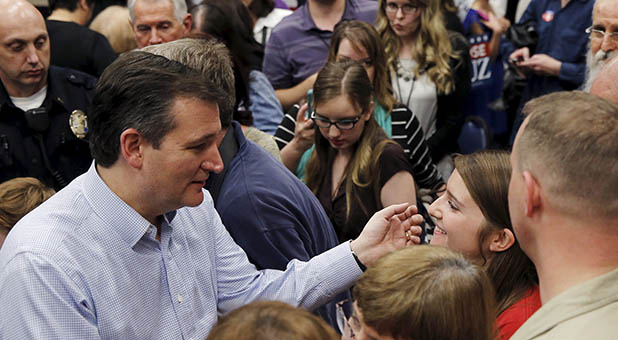Jason Johnson, chief strategist for Cruz for President, prepared the following memo explaining why Ted Cruz is the only candidate who can defeat Donald Trump:
Three states into the Republican nominating process, the field has narrowed from 17 to five candidates. And of the five candidates remaining, only three are viable: Cruz, Trump and Rubio.
Marco Rubio cannot beat Trump.
Trump can’t be beaten from the political Left, with a candidate who emphatically supports amnesty and who allows Trump to be considered the “conservative” in that context.
Rubio has yet to win a primary state. On This Week with George Stephanopoulos, Sen. Rubio was asked simply, “What state can you win?” Rubio replied, Florida on March 15.
Rubio’s stated strategy is to lose the first four primary states, lose every state on Super Tuesday, then lose every state on March 5, then lose every state on March 8, and then finally win in Florida (where he’s currently polling third, behind Donald Trump and Ted Cruz).
By March 15, 26 states or territories will have voted, and Rubio does not plan to win any of them. Almost 50 percent of the delegates will have already been allocated; Rubio will win almost none, and then he’ll hope for resurrection in Florida. That’s an even less plausible path to victory than Mayor Rudy Giuliani’s “wait for Florida” strategy in 2008.
Rubio might argue that Bush leaving the race gives him both votes and resources. But Rubio and his allies spent tens of millions in the first three states, with disappointing results. And the small percentage of voters supporting Bush would not significantly change the dynamic of the race even if they all moved to Rubio—which they won’t.
Rubio is popular in the donor community and the D.C. lobbyist community, but there is no evidence that money is Rubio’s problem.
- Rubio and his allies have already spent over $75 million with limited results. He has not won a single state.
- In contrast, Cruz and his allies have spent $15 million less, and despite being outspent, Cruz beat Rubio two out of three times winning first in Iowa (where Rubio was third) and then finishing a strong third in New Hampshire (where Rubio was fifth), before effectively tying Rubio in South Carolina.
- Even with a massive large-donor advantage, Rubio is seriously behind in fundraising. As of Dec. 31, Cruz had nearly as much money in the bank as Rubio, Bush, Christie, and Kasich combined.
In South Carolina, Rubio’s team repeatedly promised a win. Their proclaimed strategy was “3-2-1” with third in Iowa, second in New Hampshire and first in South Carolina. Everything lined up in their favor. Much of their senior team is from South Carolina and has run South Carolina campaigns for decades. They ran millions of dollars in ads attacking Cruz. Rubio was endorsed by South Carolina’s very popular governor, senator and congressman and yet, with the full support of the South Carolina establishment, he still couldn’t win, losing to Trump by 10 points.
If Rubio can’t win with all of the advantages and money in South Carolina, where can he win?
Cruz has beaten and can beat Trump.
Cruz is the only candidate that has beaten—and can beat—Trump. Historically, no candidate that failed to win one of the first three states has ever won the nomination.This cycle, only two people have won an early state: Ted Cruz and Donald Trump.
In contrast to Rubio, Cruz has already delivered on his promise to energize evangelicals and conservatives. The results from the first three states show that only Cruz can compete with Trump for the Republican base, and he can also reunite the members of the Reagan Coalition who are critical to winning the nomination and the general election.
And Cruz wins not just with the winning Republican base of the past, he is also winning with the young voters who will power the Party in the future.
Head to head, Cruz beats Trump by 16 points: 56 percent to 40 percent. And in the general, Cruz consistently beats Hillary; while Trump consistently loses to Hillary.
Cruz can beat Trump for the nomination and can put a Republican in the White House. Rubio has no realistic path to the nomination, and Trump has a very difficult path to general election success.
Republican Base Vote
Rubio does well with moderates. But moderates are only 22 percent of the Republican primary vote nationwide. To win, to beat Trump, a candidate must do well with the Republican base.
Rubio is consistently third with conservatives, very conservatives and evangelicals. Cruz and Trump are battling neck and neck for these key groups, which together comprise over two-thirds of the Republican primary vote.
Ted Cruz is substantially outperforming Rubio, and in many cases beating Trump, for the Republican base vote. The core of the party is with Cruz and may not be with Rubio head-to-head against Trump.
The battle for conservative voters is clearly between Cruz and Trump, with Cruz winning one state and Trump edging out Cruz in the other two; Rubio lags behind in all three.
Among very conservative voters (54 percent nationwide), Cruz has beaten Trump twice, in South Carolina and Iowa. Rubio, in all three states, is again lagging far behind.
Evangelicals are clearly energized by both Cruz and Trump, with Trump edging out Cruz in South Carolina and New Hampshire and Cruz beating Trump in Iowa. Rubio remains consistently in third.
Reagan Coalition
Rubio does well with wealthy voters. But without the working-class Reagan Democrats, Republicans cannot win the general. Ted Cruz competes much better against Trump among the blue-collar voters, who were critical to the Reagan coalition in 1980 and 1984, and who largely sat out the 2012 election, than does Marco Rubio.
Cruz has been second among voters with a high school diploma or less in all three states so far and has been as much as 11 points ahead of Rubio among these voters.
Cruz also substantially outperforms Rubio and nearly beat Trump in South Carolina among voters who make less than $50k per year.
Young Voters
The future of the party isn’t just re-invigorating the Reagan coalition, it is also reaching out to younger voters. While Rubio claims to be the agent of generational change, the data show it is actually Ted Cruz who has won the youth vote in two of the three elections thus far (Iowa and South Carolina), and he came in second with these voters in New Hampshire.
Cruz has now beaten Rubio with young voters in three very different states, three times in a row.
New Voters Comparison
There has been record turnout in each of the first three states: 186,874 in Iowa (121,503 in 2012); 284,120 in New Hampshire (248,485 in 2012); and 737,917 in South Carolina (601,166).
While some of these voters are undoubtedly Trump voters, there is also a lot of evidence that Ted Cruz is delivering on his promise to energize and engage more conservatives and evangelicals and expand the base of the party.
Evangelical participation in the primary process has grown substantially with record-setting participation in South Carolina and growth in Iowa as well. Enhanced evangelical turnout will be critical to winning the general election in November.
The fraction of the vote made up of conservatives has grown in each of the early states. Very conservatives have also been a larger portion of the vote in two of the three states so far.
And that energized turnout, among conservatives, very conservatives, evangelicals and Reagan Democrats is the only way for Republicans to prevail in the general election in 2016.
See an error in this article?
To contact us or to submit an article
























